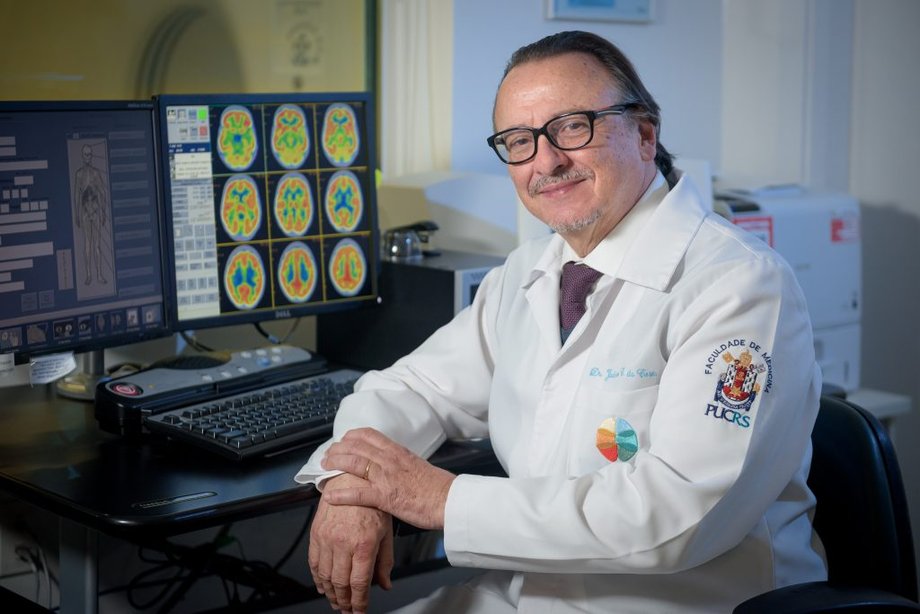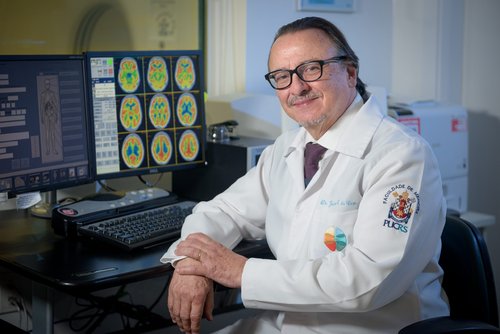From planning to InsCer design: a long way
Dr. Jaderson Costa da Costa, director of InsCer, tells of his dedication to science
A man passionate about knowledge. Thus, we could define Dr. Jaderson Costa da Costa, director of the Brain Institute of Rio Grande do Sul (InsCer) and vice-rector of PUCRS. As a neurologist and neuroscientist, and a career of more than 50 years of research on the human brain, he is proud to have believed that it was possible to develop, together with the Marist Network, an institute focused on this type of study: InsCer.
His Marist origin comes from Colégio Marista Rosário, in which he is very proud to have been an applied student: “My father was a student at Colégio Marista São Francisco, in Rio Grande, and insisted that I also study in a Marist school . When I entered Rosario, he made some negotiations to be able to pay for the school and always told me that I needed to dedicate myself not to run. I took it so seriously that I got to be an average of ten in all subjects ”, recalls Costa.
After finishing basic education, he started a medical course at the Federal University of Rio Grande do Sul. In the first years of college, he discovered his passion for neurology: “I remember being delighted with the brain anatomy classes . I kept looking at a big picture that I had in the laboratory and I thought: how can it work so well ?! ”
With the completion of the medical course and specialization in neurology, Jaderson began his work as a professor at PUCRS. Over the years, he continued studying and did master's, doctorate and specializations, in Brazil and abroad. In the 2000s, he assumed the direction of the Institute of Biomedical Research at PUCRS (IPB). He, who has always been passionate about research, had the opportunity to dedicate himself even more to this activity and help other professionals to develop their own studies.
“The work within the Biomedical Research Institute started to grow so much that we no longer had the means to attend. Our biggest fear was to slow the development of some study because it does not have an adequate structure ”, says Costa. The dream of forming a broader and multidisciplinary institute was beginning to be born at that moment.
The creation of InsCer
With the development of many studies at IPB, Dr. Jaderson's desire to create a space focused on brain research began to become more and more real. The challenges were great: planning an adequate structure, raising funds and mobilizing the scientific community for this project. Even so, he remained steadfast in his goal.
“I have always believed in Marists a lot. When we surrender to a project as robust as InsCer, we need to be sure that management will give us the necessary support and support, and that has never been lacking in my entire work trajectory ”, he says.
The Institute was developed in cycles of eight years. From 2004 to 2012, it was the dream and planning phase: “We worked hard to bring the project to fruition. There were several articulations with government agencies to obtain incentives for the works, meetings with the leaders of the academic area that supported our initiative, approvals of plants, purchases of equipment, among others ”. In addition, this period was also important for conducting team training: “We seek the‘ brains ’and form the teams that are part of the soul of InsCer,” explains the director.
The total construction of the planned nine thousand square meters could not be completed in the first phase, however it was established that a second phase of works would be able to develop the complete project. From that moment, the second cycle of InsCer begins: the realization of the dream.
The inauguration, on June 6th, 2012, was the starting point of this trajectory. Jaderson recalls how significant it was to launch the enterprise on the day we celebrated the founder of the Marist Institute: “Many authorities participated in the inauguration of InsCer and I remember that when we chose the date, we made a point of saying how significant this moment was for us as Marists ”.
For him, the success of InsCer is due to the people who dedicate themselves daily to doing quality work and believe in innovation as an opportunity to make a difference for society: “The Brain Institute is a multidisciplinary space, where all knowledge fits. This is my legacy, to motivate researchers from different areas to work together for the benefit of the human being ”, he evaluates.
A new phase in the middle of the pandemic
From 2012 to 2020, it took another eight years of work and dedication to obtain the necessary resources for the construction of phase two. From 2020, a new cycle begins.
What was not imagined is that, during the inauguration of the Institute's final stage, the world would be going through a pandemic. “It never crossed my mind that this could be happening. I talked a lot with Brother Evilázio Teixeira and with Brother Inacio Etges about the moment we are living and the importance it will have for society to be able to deliver work with even more quality, developed within this new structure ”, he says. The works of phase two are already being concluded and have been little impacted by the Covid ‑ 19 crisis. Planning continued to be carried out and the inauguration will take place until the end of the year. “I tell our researchers and collaborators that we need to believe that everything will come to pass in time. When I planned InsCer, I had drawings, plans and dreams to show people that they would invest in this dream, today we have concrete work, research, radiopharmaceuticals and excellent quality deliveries for the whole of society ”, he points out.
And it is precisely from this quality delivery that Jaderson believes that the valorization of post-pandemic science will emerge: “Society is managing to perceive the results of the research in practice. In a more clear and objective way, we are showing how much the study, in all areas, should be valued in Brazil, because it will be through science and innovation that we will arrive at the solutions to fight the coronavirus ”, he evaluates.
Source: This article appeared in the August 2020 edition of the Provincial Circular, of the Marist Network.



